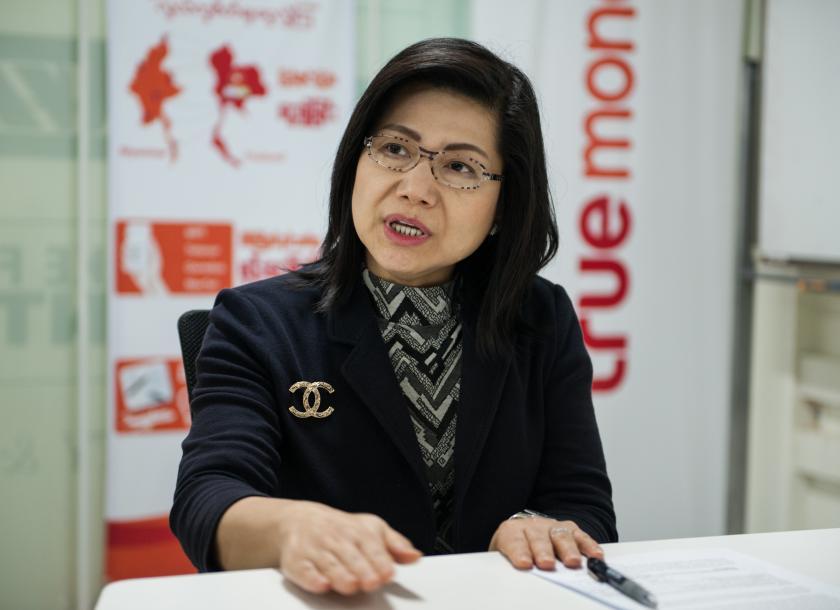TrueMoney finds a niche in Myanmar’s mobile fintech space
TrueMoney, one of the newest additions to the string of fintech firms vying for a slice of the mobile money market in Myanmar, is upping its game in the face of rising competition.
Its strategy is to meet demand for a service to facilitate international mobile cash transfers by Myanmar residents. “We have a channel that connects the mobile money market across the region,” Siriporn Nimtiparat, managing director of TrueMoney Myanmar Co, told The Myanmar Times.
TrueMoney, a Thai company, provides mobile financial services allowing users to deposit cash in mobile accounts online or at physical point-of-sale outlets and transfer cash equivalents to a network of agents domestically or overseas.
In ASEAN, TrueMoney is the only fintech company to have established a mobile money network in Thailand, Cambodia, Vietnam, the Philippines, Indonesia and Malaysia, allowing users to transfer money between these countries. “Myanmar is our newest market in ASEAN,” said Ms Siriporn.
TrueMoney is also the only mobile payments firm that allows Myanmar workers in Thailand to send money home, all within the hour.
It has established partnerships under which folks can transfer money home through point-of-sale facilities at 7-Eleven convenience stores and True Coffee outlets in Thailand.
We are targeting the four million or so Myanmar workers based in Thailand who need to transfer money back home but who don’t have local bank accounts.
– Siriporn Nimtiparat, TrueMoney Myanmar
Currently, some US$2 million is now being transferred between Thailand and Myanmar each day.
Rising competition
TrueMoney is expanding in Myanmar at a time when competition for the country’s unbanked population is intensifying. Around 80 per cent of the population do not have bank accounts in Myanmar, where most prefer to carry large wads of cash. With mobile money technology, many operators see the country leapfrogging bank accounts altogether.
“With mobile money services there is no need to set up a bank account. This service is for the unbanked who want to improve their quality of life,” said Ms Siriporn.
Last October, Norway’s Telenor Group, one of the three mobile phone operators in the country, launched Wave Money, a mobile payment service rununder a joint venture with First Myanmar Investment and Yoma Bank. The company said some 250,000 people have used the service since. Now,there are plans to make it available at retail stores before year end.
A local mobile financial services start up, OK Dollar, was also launched last year. Operated by the Myanmar logistics and hotel conglomerate Super Group, OK Dollar claimed to have more than 100,000 users earlier this year.
This year, another operator, Qatar’s Ooredoo, launched a similar fintech service called M-Pitesan in partnership with Myanmar’s Co-operative Bank.
Different license
Notably, all three service providers have been granted Mobile Financial Services licenses from the Central Bank of Myanmar (CBM) under a regulation enacted March 30, 2016 to protect customers.
In contrast, TrueMoney operates under AGD Bank’s Mobile Banking license. In Myanmar, the CBM issues two licenses for mobile fintech services – Mobile Banking, under which fintech companies operate under the license a traditional bank, and Mobile Financial Services, which are run by the operators themselves.
The main advantage of operating in conjunction with a bank is the higher transaction limit. “We allow our users to remit up to K1 million per transaction per day, whereas under the other license, the limit is only K200,000 a day,” Ms Siriporn noted.
Besides TrueMoney, Myanmar Mobile Money, myKyat and Ongo Mobile Money, which this year sold a 22pc stake to the Bank of Canada, also operate under a Mobile Banking license.
TrueMoney claims its other advantages include “very reasonable fees” and service reliability. “We have built up a level of trust among users that the money they send will reach home within an hour at a reasonable fee. This is the foundation we are building on to strengthen our network and raise financial literacy among the unbanked,” said Ms Siriporn.
Strong backing
TrueMoney’s biggest trump card against its competitors though is strong financial backing from its Thai shareholders. The company was founded in 2003 as part of Thailand-listed communications giant True Corporation, which is more than 50pc owned by Thai conglomerate CP Group and 18pc owned by China Mobile.
In 2014, True Corporation spun off all its online businesses, including TrueMoney, under a private subsidiary called Ascend Group. TrueMoney entered Myanmar that same year.
Backed by sufficient finances and an existing regional presence, TrueMoney now plans to widen its Myanmar customer base beyond workers in Thailand to parents who want to send money to their children pursuing studies elsewhere in the region.
It also sees opportunities to service businesses within Myanmar and their suppliers, subsidiaries or holding companies in ASEAN. “We can help businesses that require lots of working capital and cash flows to make their payments on time and grow,” said Ms Siriporn.
TrueMoney also wants to support the government by providing a platform for people to pay their power, water and other public bills. “By the end of the year, we’ll start seeing many of these developments taking shape,” she said.
Over the longer term, TrueMoney will develop a customised app for the Myanmar market, enabling customers to conduct all their financial affairs from their mobile phone. This will include loan repayments and applications,” said Ms Siriporn.
“Our strategy is to target specific segments of the market and leverage on our regional network. In the long run, we will also move towards a mobile app that covers the entire region. This is how we are different from our competitors,” she added.
Source: https://www.mmtimes.com/news/truemoney-finds-niche-myanmars-mobile-fintech-space.html


 Thailand
Thailand




